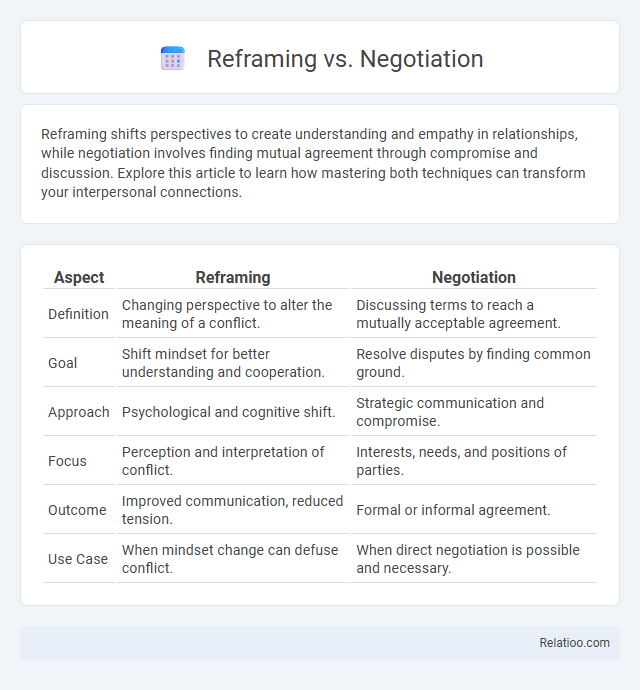Reframing shifts perspectives to create understanding and empathy in relationships, while negotiation involves finding mutual agreement through compromise and discussion. Explore this article to learn how mastering both techniques can transform your interpersonal connections.
Table of Comparison
| Aspect | Reframing | Negotiation |
|---|---|---|
| Definition | Changing perspective to alter the meaning of a conflict. | Discussing terms to reach a mutually acceptable agreement. |
| Goal | Shift mindset for better understanding and cooperation. | Resolve disputes by finding common ground. |
| Approach | Psychological and cognitive shift. | Strategic communication and compromise. |
| Focus | Perception and interpretation of conflict. | Interests, needs, and positions of parties. |
| Outcome | Improved communication, reduced tension. | Formal or informal agreement. |
| Use Case | When mindset change can defuse conflict. | When direct negotiation is possible and necessary. |
Understanding Reframing in Communication
Reframing in communication involves altering the perspective or context of a message to change its meaning and impact, enhancing mutual understanding and reducing conflict. Unlike negotiation, which centers on reaching an agreement through compromise, reframing shifts the focus to how information is interpreted and expressed. Mastering reframing techniques allows communicators to break negative patterns and foster positive dialogue by redefining problems and solutions from a fresh viewpoint.
What is Negotiation? Key Concepts
Negotiation is the process where two or more parties engage in dialogue to reach a mutually beneficial agreement, balancing interests and resolving conflicts. Key concepts include preparation, effective communication, understanding BATNA (Best Alternative to a Negotiated Agreement), and finding win-win solutions. Your success in negotiation depends on strategic planning, clarity of goals, and adaptability throughout the discussion.
Core Differences Between Reframing and Negotiation
Reframing shifts the perspective or interpretation of a situation to create new meaning and open up alternative solutions, while negotiation involves a direct dialogue aimed at reaching an agreement between parties with differing interests. Core differences lie in reframing's emphasis on altering cognitive perceptions and emotional responses, contrasting with negotiation's focus on bargaining, compromise, and mutual concessions. Reframing changes the context or framework of the problem, whereas negotiation works within the established framework to resolve conflicts or finalize deals.
Psychological Foundations of Reframing
Reframing relies on cognitive psychology principles, enabling Your mind to alter the perception of a situation by changing its context or meaning, which reduces negative emotions and promotes adaptive thinking. Unlike negotiation, which involves mutual concessions and external problem-solving strategies, reframing targets internal psychological shifts to foster resilience and emotional regulation. Understanding these foundations helps maximize the effectiveness of reframing as a tool for personal growth and conflict resolution.
The Role of Negotiation in Conflict Resolution
Negotiation plays a pivotal role in conflict resolution by facilitating direct communication between parties to reach mutually acceptable agreements. Unlike reframing, which shifts perspectives to alter the emotional or cognitive context of a dispute, negotiation actively engages stakeholders in dialogue and compromise. Effective negotiation strategies enhance problem-solving, reduce hostility, and promote sustainable solutions in diverse conflict scenarios.
Benefits of Reframing Over Traditional Negotiation
Reframing offers a significant advantage over traditional negotiation by shifting the focus from conflicting demands to collaborative problem-solving, fostering mutual understanding and creative solutions. Unlike negotiation, which often centers on win-lose outcomes, reframing emphasizes perspective transformation that reduces resistance and uncovers underlying interests. This approach leads to more durable agreements and improved relationships by promoting empathy and shared goals rather than positional bargaining.
Integrating Reframing into Negotiation Strategies
Integrating reframing into negotiation strategies enhances your ability to shift perspectives and reshape the dialogue surrounding conflicts or divergent interests. Reframing helps to identify underlying interests and transform negative or rigid positions into collaborative opportunities, improving communication and problem-solving. By combining negotiation tactics with cognitive flexibility through reframing, you create a dynamic process that fosters mutual understanding and more effective agreement outcomes.
Common Mistakes in Reframing vs Negotiation
Common mistakes in reframing versus negotiation include confusing the two processes, where reframing focuses on altering perceptions and context of issues, while negotiation centers on reaching mutual agreements through concession. Many fail to recognize that reframing requires a deep understanding of cognitive biases and emotional triggers, whereas negotiation demands strategic communication and compromise skills. Overlooking the distinct goals and techniques of each approach often leads to ineffective conflict resolution and missed opportunities for collaborative problem-solving.
Real-World Examples: Reframing and Negotiation in Practice
Reframing involves changing the perspective on a situation to find new solutions, such as a manager viewing a missed deadline as an opportunity for team growth rather than failure. Negotiation focuses on reaching mutual agreements, exemplified by salary discussions where both employer and employee seek beneficial terms. In practice, combining reframing and negotiation enhances conflict resolution by shifting mindsets and fostering collaborative agreements, as seen in international trade deals where parties reframe disputes to identify common goals before formal bargaining.
Choosing the Right Approach: When to Reframe and When to Negotiate
Choosing the right approach between reframing and negotiation depends on the context and your desired outcome. Reframing shifts perspectives to create new understanding and reduce conflicts, ideal when emotional barriers or fixed mindsets impede progress. Negotiation is best when both parties have clear interests and seek a mutually beneficial agreement through compromise and trade-offs.

Infographic: Reframing vs Negotiation
 relatioo.com
relatioo.com